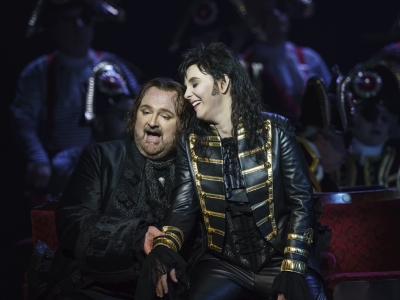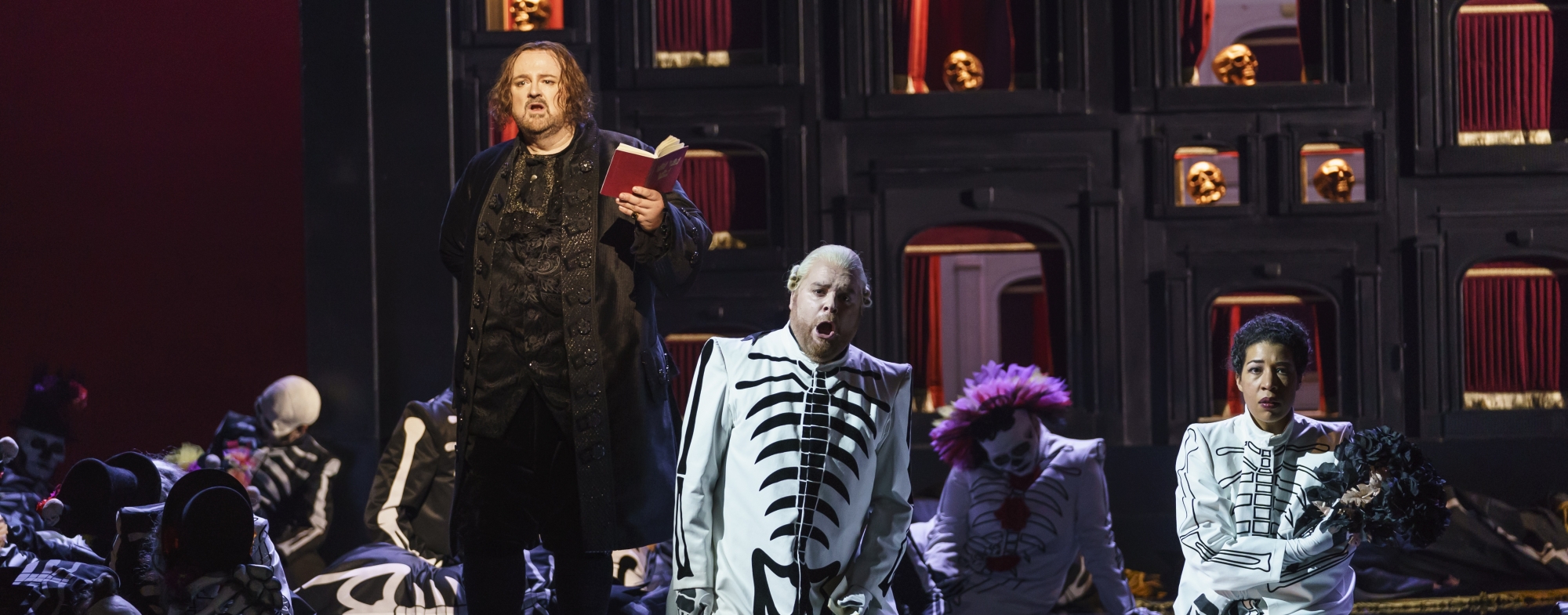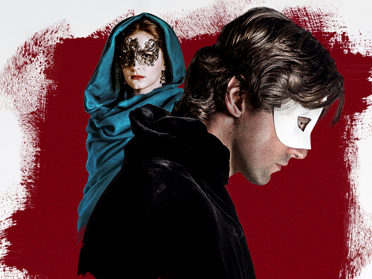Nigel Jarrett visits the Welsh Millennium Centre to witness Welsh National Opera’s latest production of Verdi’s Un ballo in maschera.
Where are we and who are they? It’s a double query often voiced with irritation by many of today’s opera goers, used to seeing directors stage music-theatre in concentration camps, pock-marked war zones, and derelict shopping malls; in fact, anywhere that post-dates the original or reflects its characters through a distorting lens. Location was an issue at the start for Verdi’s Un ballo in maschera, about the assassination of a Swedish king when depiction of regicide made the censors, after-shocked by revolution in Europe and with current ferment closer to home, fearful and thus liberal with their red ink. One Felice Orsini had tossed a grenade at Emperor Napoleon III in 1858 over a decade before the Risorgimento was complete. So, by the time of the opera’s Rome première a year later, and after further revision, Verdi had removed the setting from Sweden to Colonial America. The conception, however, of Welsh National Opera’s artistic director, David Pountney, in his new show for the company, is neither especially regal nor gubernatorial. In fact, the whole thing’s a bit of a surrealistic hoot and, at the end, mischievously liberty-taking. We are not in Sweden (despite the flags), or Boston (despite nothing in particular) or the right-royal Kingdom of Gilberto-Sullivania (despite the vaudeville shuffling). We are in Pountneyland.

It’s always an interesting place. Pountney’s gift for creating stage pictures that are never out of kilter with the music or the opera’s flow, despite their sometimes outré appearance, is almost a trademark. He’s a musician’s director, and on top form an indisputably great one. Given a plot not quite as batty as the composer’s earlier Il trovatore but also involving a risible exponent of the runes – the bad egg Ulrica here; Azucena there – and given the original to-and-fro, it must be tempting for directors to jettison tradition and fashion something of their own. Un ballo in maschera is an Italian ‘melodramma’, meaning a story treated operatically, and not to be confused with the English ‘melodrama’, meaning an exaggerated appeal to the emotions, though there are some points where the two meet. For instance, when the ‘king’, Riccardo, having been soothsayed to expect that the first person to shake hands with him will be his future assassin, and we see who it is, one could imagine a deep and universal intake of breath in the audience. Having dispensed more or less with particularity of time and place, Pountney presents us with a story among elevated folk of tortured love between Riccardo and Amelia, the wife of his minister Renato (for it is he, the aforesaid ‘king’-killer), and a resulting act of vengeance clothed in a masquerade – the eponymous ‘ball’. Viewed thus, Pountney then proceeds to fill the emptied canvas with colour, humour and eccentricity, as befits a story stripped of its accoutrements to become a narrative of the mind. It’s easy to do in some operas. So there is a nightmarish quality to a tale that’s come from nowhere and appears to be without destination, or at least one with no foreseeable consequences beyond a power vacuum, if you can have one of those in a dream. Such nakedness might as well attract attendant wackadoodles as anyone else, complete with choreographer Michael Spenceley’s cakewalks.
Ulrica is surrounded by shades spliced by axes and daggers and has a curious roving brief throughout; Raimund Bauer’s set, lit louringly by Fabrice Kebour, consists of ever-moveable flats cast in images of an opera house (King Gustav III of Sweden, on whom the original Riccardo was based, was murdered in Stockholm’s real one); Ulrica and two of the main conspirators are wheeled about on ten-feet high chairs; the chorus appears variously in skeleton outfits and fox-heads with bad cases of red eye; characters sit in ripped-out rows of theatre seats; at the start of the proceedings, Riccardo emerges from a tomb, on which the page Oscar lies statuesquely before springing into life; and, at the end, it is not Riccardo who is assassinated but another. As always, the company’s printed synopsis tells the story straight, without these baroque flourishes and departures; so that the audience, having had its breath taken away once, or twice, is presented with a disconnection. Most of them, wise to directorial quirkiness, take it in their stride. The uncoupling they should really worry about is more significant, especially as Verdi and his librettist Antonio Somma gave their main characters comparatively sparse material with which to present themselves as anything like rounded.
With Verdi’s music played and sung intensely and movingly as it is here (conductor Carlo Rizzi and the orchestra insisting on Verdian flair exquisitely shaped but unrestrained), the story seems to proceed without need of a bizarre mise-en-scène and, indeed, in spite of it. Fair enough, Gwyn Hughes Jones portrays this version of Riccardo, accurately one feels, as a leader no better than he ought to be (the wheeled-on conspirators, played by Jihoon Kim and Tristan Hambleton, give reasons for wanting him done in); Mary Elizabeth William’s Amelia is the embodiment of hard-core tragedy, and the rôle is heart-wrenchingly sung; Roland Wood’s solid and even baritone, if a tad unforgiving, makes Renato a character to be reckoned with; vocally, Ulrica seems to sit too low in places for Sara Fulgoni, though life in the air with those encircling weirdos must affect her concentration; Julie Martin du Theil’s Oscar is an impish presence; and Jason Howard as Silvano the sailor an example of a handsome voice way down in the cast list but making a welcome return to the WMC stage. Gareth Dafydd Morris as the Judge and Andrew Irwin’s Servant complete a tight-knit company that looks good, or outrageous, in Marie-Jeanne Lecca’s costumes.

All this emerges from the set’s louring black-and-red Gothic ambience. There’s a lot in the production that’s amusing. Could it be a comment on the vanity of human wishes or human frailties? Or did Pountney take his lead from something said in the scene where Riccardo et al decide to visit Ulrica, aloft with sorcery on her personal cloud of dry ice: ‘madness brings a lightness to life’, or words to that effect? Not much light relief here, though.
But what music! Rizzi is aware that the principals have relatively scant opportunities to make much of themselves and that the tunes and set-pieces are nonetheless some of the best Verdi wrote; so he gives them musical context and encouragement. It is the music, played and sung without let or distraction, not least by the company’s robust chorus, that wins the day.
In this production, the conspirators Tom and Samuel bear the names given to them in Verdi’s Bostonian conversion, and at one point the crowd waves Swedish flags. They are references to Verdi’s original problems with the censor, but seemingly neither here nor there in relation to what’s going on, even in terms of a story in which some sort of political authority clashes with personal travail. Call them traditionalists, but some see merit in a more-or-less straight traduction from history, in which the regicides are alt-Right and the ‘king’ a liberal and a lover of the arts. A faint ringing of bells at the suggestion means that something could be made of it, given a Republican rather than a monarchic setting thousands of miles away from, say, government buildings being de-contaminated post-Apocalypse.
Nigel Jarrett is a former newspaperman and a double prizewinner: the Rhys Davies Award for short fiction and, in 2016, the inaugural Templar Shorts award. His first story collection, Funderland, published by Parthian, was praised by the Guardian, the Independent, the Times and many others, and was long listed for the Edge Hill Prize. His début poetry collection, Miners At The Quarry Pool was described by Agenda poetry magazine as ‘a virtuoso performance’. Jarrett’s first novel, Slowly Burning was published in 2016, as was his second story collection, Who Killed Emil Kreisler? Templar is about to bring out his three-story pamphlet, A Gloucester Trilogy. Based in Monmouthshire, Jarrett writes for Jazz Journal, Wales Arts Review, Acumen poetry magazine, and several others. His poetry, fiction, and essays appear widely. For many years he was a daily newspaper music critic.



 Enjoyed this article? Support our writers directly by buying them a coffee and clicking this link.
Enjoyed this article? Support our writers directly by buying them a coffee and clicking this link.







